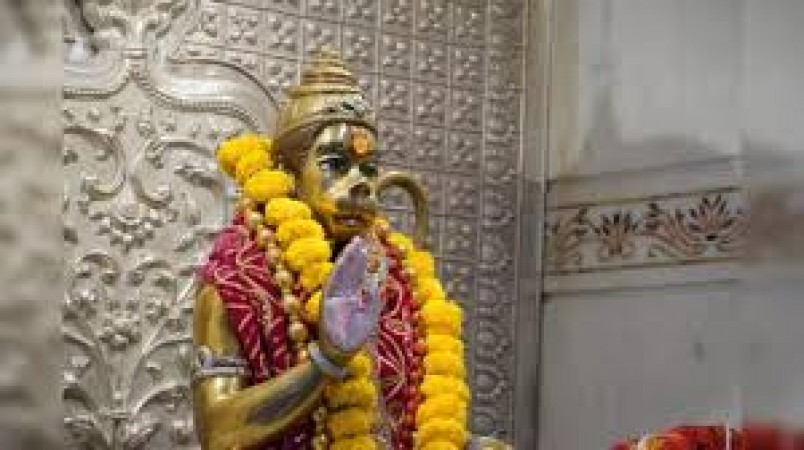
In the rich tapestry of Hindu mythology, the story of Hanuman, also known as Bajrangbali, begins with his divine birth. Anjana, an Apsara cursed to live as a monkey, and Kesari, the King of the Monkeys, were his parents. Anjana, devoted to Lord Shiva, yearned for a child. She embarked on a journey of intense penance to earn the blessing of motherhood from her beloved deity. Impressed by her unwavering devotion, Lord Shiva granted her the boon of bearing a son who would inherit the strength of the Vayu, the wind god, and become invincible.
Anjana's Blessing
Anjana's prayers bore fruit, and she gave birth to a divine child, infused with the powers of the wind. This child came to be known as Bajrangbali, the mighty Hanuman. His birth was a symbol of divine intervention, marking the convergence of celestial forces to create a being of unparalleled strength and valor.
Pawan Putra - The Son of the Wind God
Bajrangbali, often referred to as Pawan Putra, or the Son of the Wind God, owed his extraordinary abilities to Vayu, who had bestowed upon him his divine essence. Endowed with the agility and swiftness of the wind itself, Hanuman possessed an indomitable spirit and boundless courage from the moment of his inception.
The Naming Ceremony
The Incident with the Sun
As a young child, Hanuman displayed his extraordinary strength and courage through various exploits. However, it was during one of these early adventures that he earned the name Hanuman. Legend has it that Hanuman, mistaking the sun for a ripe mango, decided to devour it. Ignoring the warnings of the gods, he leaped into the sky, determined to claim his prize.
Indra's Response
Surya, the sun god, alarmed by Hanuman's audacious feat, sought the intervention of Indra, the king of gods. In response, Indra hurled his mighty weapon, Vajra, at Hanuman, striking him on the chin. Despite this formidable assault, Hanuman remained undeterred in his quest to reach the sun.
Vayu's Fury
Witnessing his son's plight, Vayu, the Wind God, was consumed by fury. In an act of righteous indignation, he withdrew his vital breath from the universe, plunging the world into chaos and disrupting the balance of life itself. The consequences of Vayu's rage were dire, prompting the gods to intervene and restore order to the cosmos.
The Gods' Intervention
Alarmed by the repercussions of Vayu's actions, the gods implored him to relent and restore the balance of life. Vayu agreed, but on the condition that Hanuman would be blessed with immortality and endowed with unparalleled powers. Thus, Hanuman emerged from this divine ordeal, not only unscathed but also elevated to the status of an immortal being.
The Significance of the Name
Origin of the Name Hanuman
The name "Hanuman" is derived from the Sanskrit words "Hanu" (jaw) and "man" (disfigured or prominent). It refers to the slight disfigurement Hanuman sustained as a result of Indra's Vajra striking his chin during his encounter with the sun.
Symbolism
The name Hanuman holds profound symbolic significance. It serves as a reminder of Hanuman's unwavering devotion, resilience, and indomitable spirit in the face of adversity. Despite facing formidable challenges from the divine realm, Hanuman remained steadfast in his pursuit of righteousness and his unwavering commitment to his ideals.
Hanuman - The Embodiment of Devotion
An Epitome of Bhakti
Hanuman's devotion to Lord Rama is legendary. Throughout the epic Ramayana, Hanuman exemplifies the essence of bhakti, or devotion, through his unwavering loyalty and selfless service to his beloved master.
Role in the Ramayana
Hanuman played a pivotal role in the Ramayana, aiding Lord Rama in his quest to rescue his wife, Sita, from the clutches of the demon king, Ravana. His unwavering commitment to righteousness and his unwavering devotion to Lord Rama make him a revered figure in Hindu mythology.
Legacy and Worship
Even today, Hanuman is venerated as a symbol of strength, devotion, and courage. His temples are scattered across the length and breadth of India, and his devotees seek his blessings for protection, courage, and spiritual enlightenment.
In conclusion, the story of how Bajrangbali earned the name Hanuman is not merely a tale of divine intervention but also a testament to his enduring legacy as a symbol of devotion, strength, and resilience. Through his exemplary life and deeds, Hanuman continues to inspire millions of devotees around the world, reminding them of the power of unwavering faith and the triumph of good over evil.
How Morning Walks Transform Your Health: Know The Benefits of Starting Your Day with Walking
Loneliness is a serious mental illness, WHO said it is fatal